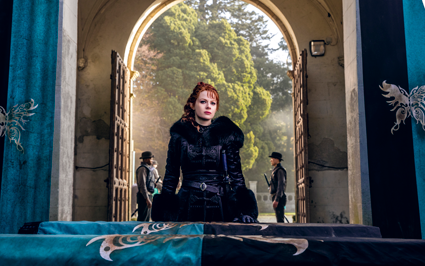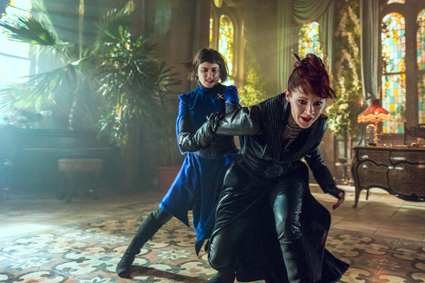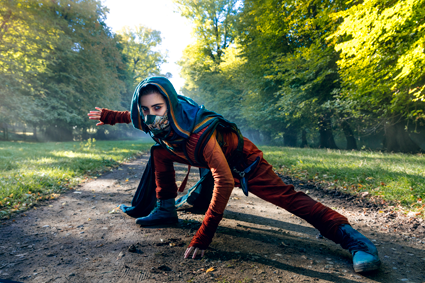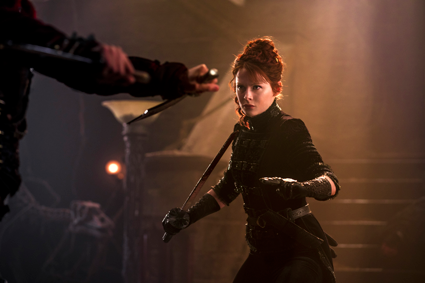Behind the Screens with Joshua Maloni
When audiences first met The Widow on AMC's "Into the Badlands," she was single-handedly taking down a bar full of angry, weaponized, pirate-looking bad men. As her story continued through two seasons, The Widow grew more fierce - and feared - as she outkicked, outfought and outdueled cogs, clippers and barons - including series centerpiece Sunny (Daniel Wu); Nathaniel Moon (Sherman Augustus) - he of nearly 1,000 sword kills; and, sadly, even her own daughter, Tilda (Ally Ioannides).
As this black clothes-clad, well-made-up, intimidating figure spread her arms over the badlands and sent her butterflies to route her foes, something unexpected began to happen. In the season three premiere, fans began to see less of The Widow, and more of actress Emily Beecham.
The character's hair and makeup were a little more subdued. The stunt double was a little less used. And the storyline allowed the person behind the personality to shine.
It appears as though "Into the Badlands" showrunners saw what the rest of us did - that, as wickedly grand as The Widow is with a sword, Minerva is just as awe-inspiring when she's morally conflicted.
Beecham, at just 5'5, is larger than life when given two blades. But it's her solemnness and turmoil in rescuing refugees and pushing supposed savior MK (Aramis Knight) to find and use his dark power that cuts through our emotions and makes us cheer for this venturer.
They say life imitates art, but that couldn't have been farther from the truth as Beecham picked up the phone to chat about "Into the Badlands." Ioannides was feeding her homemade peanut butter cookies as they shared inside jokes and reminisced about a recent cast laser-tag outing.
There's less love onscreen. In this third season, which began in late April, The Widow and Tilda are estranged. Minerva lost Tilda - not to death, though it was a close call following their fight - but rather to her progeny's disdain of the way in which Minerva pursues the supposed greater good. The junior swashbuckler could no longer sit idly by as her mother broke a few eggs in pursuit of an omelet - in this case, a rumored paradise far from their barren, technology-deprived wasteland.
Tilda now takes from The Widow's stockpile and gives supplies to the badlands' outcasts. In the process, she vanquishes the butterfly assassins she once trained.
Unaware of her daughter's new role as robber, Minerva has placed a bounty on Tilda's life.
Can the two be reconciled? Will The Widow lead her people to a better life, or will her ambition burn the bridges to a brighter future?
Beecham offered her thoughts in this Q&A.
Tilda spars with The Widow at the end of season two.
BTS: I sort of have a theory about you and this show, but I want to ask you, you know, if we think about the pilot episode, The Widow was part of it, but not a big part of the show at that particular point in time. So, if we think about all the very interesting storylines and all the different things that we were teased with at the end of last season, for us to come back in the season three premiere and have you be front and center - and being the one leading off all of the action - what do you suppose that means? What did that mean to you and what would you say that means about the evolution of your character on this show?
Emily Beecham: I felt really pleased that she was opening the show and it was focusing a lot on her world. It was very rewarding. ... I thought that was great that they're delving more into her world, because she was a mystery in the previous seasons, and it was nice to have her looking ... like a strong warrior; and it opening up in a majestic way with her and the gorgeous black horse called Bandito - a gorgeous Spanish horse that I got to ride. I thought it was a really strong, majestic, official opening and it's fun to play her succeeding, and less of a struggle. So, the butterflies are very strong at this point.
It's fun playing a powerful character.
BTS: This is my theory and why I feel like it was important to open with you: It seems when I look at The Widow in these first couple of episodes, obviously she still is very much in the costume and that, but it seems like there's a little bit less Minerva and a little bit more Emily from what I'm seeing on screen. And I think maybe that's because, for as good as you are in the action scenes, you've been just as good, if not better, with the drama. It feels like the show is sort of rewarding you as an actress with where the storyline is going, and with you being the focal point of the series.
Do get that sense?
Emily Beecham: Well, I don't usually think like that. I'm quite modest, so I'm not naturally inclined to think that way. I mean, I hope that; that's nice if that was the reason. I do think the audiences have been drawn to her, because she's got mystique and she's strong and she's, um, a bit of an outsider, in a way, even though she's a baroness. She's a little bit of a rebel, an anarchist, and also vulnerable; and she's written in a way that makes her mysterious. And she's, yes, fighting against a lot of odds, and fighting against a lot of struggle, but still persisting, even though she's alone.
So, I think that's a really strong and likeable motive. I think a lot of people like her for that in that way. As do I. I think it's nice to play a character who is persisting against struggles and fighting for the little people - or so she says.
BTS: I mean, you just mentioned like 10 different things that she has and that she brings to the table. And I think that that's a great part of the character, but at the same time, we need to have a strong actress to bring all of those various aspects to life. So, can you tell me a little bit about your approach to the character? How was it different for the third season, and how do you bring to life all of those things - vulnerable and anarchist, sword-fighter and leader? What is the process?
Emily Beecham: Well, because this show has developed so much since season one and it's grown in size and its kind of scale and the color, and we really know what the show is more and more now, we know that the show is very playful and big and dramatic. So, it gives you freedom to know that you can play around and try things out and, yeah, have fun with the character. But also connect to the character's strong feelings.
I feel like in a way I've got an easier road that a lot of the others, because The Winow is always, we'll say she's fighting for equality and justice. And that's a really - that's an easy motive for me to connect to, because I feel strongly about equality, myself, and fairness, and people being treated well. I personally feel strongly that I don't like corruption and people in positions of power and money, which is a strong motivation for her, and makes her angry and sad, but she also has fun with the fighting element and that's a naturally enjoyable part of the show.
It's really fun to wield a sword and do all these crazy swordfights and tricks. It's really, really fun and physical. I enjoy that. So, I wanted to bring that out in her more, as well, that this is something that she excels in, and it makes her feel good. (Laughs)
And you know that you're in really safe hands, because the stunt team is so good, and the choreographers are so good, and they always make you look good - even if you fall over. You know, it's not a problem. So, that gives you see freedom and confidence to, again, really enjoy that and be playful in areas and in places that you can be.
And also the hair and makeup and costume really helps, as well, because it makes me look a bit older and larger that I am, sometimes, and the lighting, as well. (Our crew) is really, really, really good. I think especially the season, it's even stepped even more. All the Irish crew (the show has filmed in Ireland) has done such an incredible job in the scale and the quality looks so gorgeous to look at. So, you know that they're going to hopefully make you look powerful or strong-looking or striking-looking, which is a bonus and helpful, as well.
Ally Ioannides as Tilda, now a Robin Hood-esque freedom fighter.
BTS: In talking to you before and in looking at your social media and in this conversation now, I know that you're very close with Ally. The Widow and Tilda, obviously, are not quite as chummy right at the moment.
Emily Beecham: No, The Widow and Tilda are not chummy! Not at all.
BTS. No, no. I don't know how much you can say about that - I know that's a big storyline for season three. But can you tell me a little bit about The Widow's mindset? I mean, this must be really just devastating for her to have Tilda rebelling against her - what we saw at the end of last season and now being on her own and robbing from The Widow, in fact. It must be very difficult for Minerva at this point.
Emily Beecham: Yes. I felt that it might bring out some insecurities in The Widow, because she's always used to having the power and the upper-hand, and all of a sudden this, well, girl, who used to be a kid in her eyes and very innocent and trusting of her, is suddenly forming really strong opinions and actually pulling the rug from under her, and then being a genuine challenge. And a genuine concern - a genuine problem - actually becoming a foe. I think, yeah, it hits her where it hurts, but it also brings her vulnerabilities and makes her a little bit insecure and betrayed. So, there's quite a lot of personal feeling involved, which isn't very professional of The Widow. There's a personal hurt. But I think she tries to shut that out.
BTS: Of all the things that we see on screen - of, you know, Sunny and Bajie, and Sunny and MK, and Tilda and MK, I really enjoy watching you and Ally work together on screen. And the fighting aspect of it has definitely added a new layer of intrigue. Why do you suppose the two of you as actors work so well together on screen? What is it about you that's enabled you to form this bond that you have?
Emily Beecham: Ally and I have a lot of trust for each other. And Ally is a very extraordinary person. She's very intelligent and empathetic and a really good listener.
(In the background, Ioannides joked she was making Beecham say these things. The two laughed.)
She's very mature. I think, perhaps, the Tilda role has become so prominent, as well, because they can build her around Ally's not only talent but (also her wisdom), so she's got a very good understanding.
She's really nice to work with, and supportive, and fun and sensitive, and cares a lot about things. So, I think these are all very Tilda-like qualities. And, because we have trust with each other, I think we can play around with it. I mean, obviously The Widow's kind of always bossing her around and bullying her a little bit (laughs), but because we have that trust it's fine, you know? It's all playful and we can sort of push the boundaries with each other, because, you know, it's all safe when you're acting.
Sometimes with younger actresses, maybe, you've got to be cautious, but not with Ally.

































